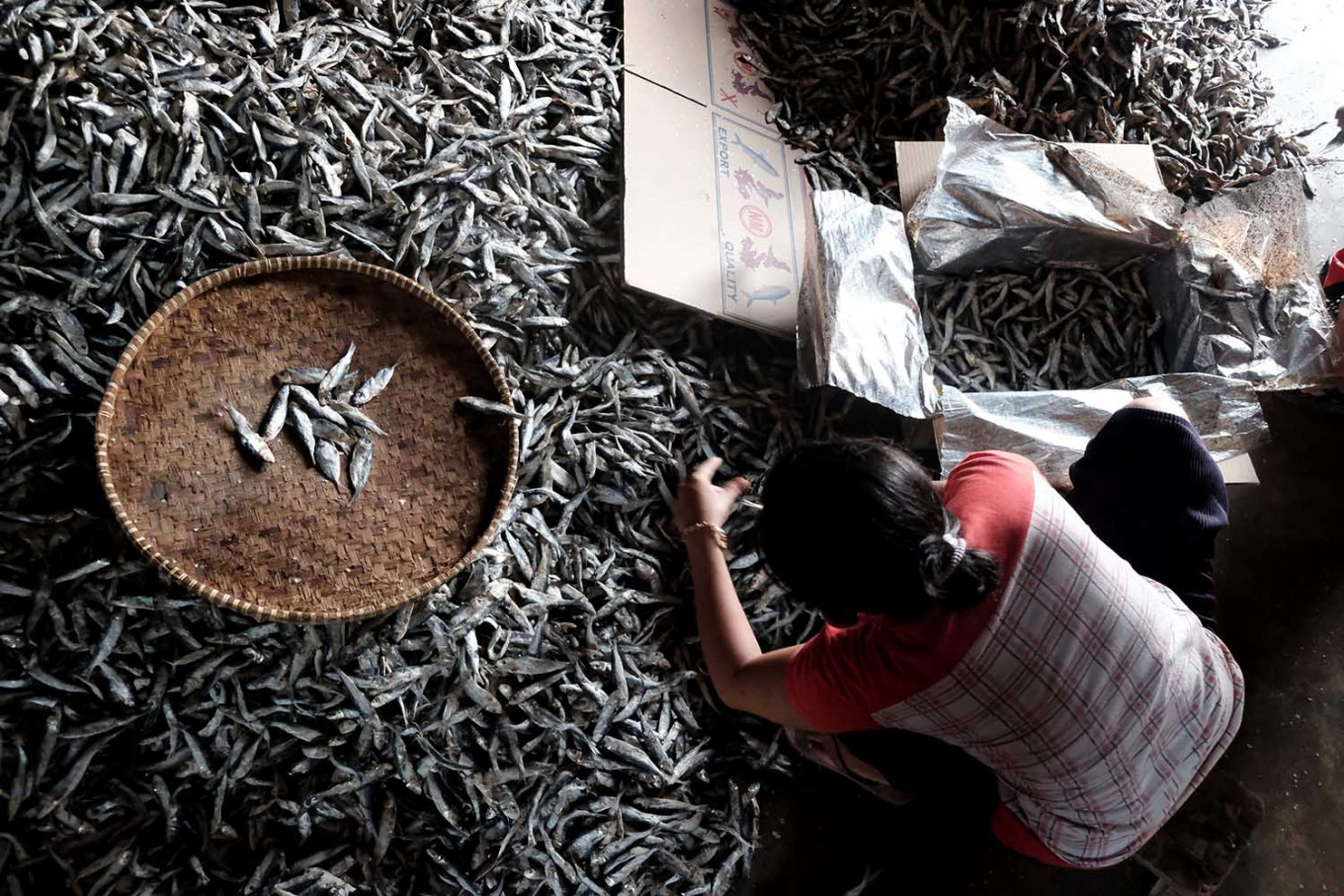Popular Reads
Top Results
Can't find what you're looking for?
View all search resultsPopular Reads
Top Results
Can't find what you're looking for?
View all search resultsRI to monitor fish exports, ease China's concerns
The government is planning to monitor its fish exports to China more strictly after Indonesia’s largest trading partner imposed a series of import suspensions over concerns about coronavirus contamination.
Change text size
Gift Premium Articles
to Anyone
T
he government is planning to monitor its fish exports to China more strictly after Indonesia’s largest trading partner imposed a series of import suspensions over concerns about coronavirus contamination.
As of November, three Indonesian fish exporters – from North Sumatra, East Java and Banten – had faced import suspensions from the Chinese customs authority after it allegedly discovered the novel coronavirus in samples of their products, according to the Indonesian Maritime Affairs and Fisheries Ministry.
Trade Ministry spokesperson Fithra Faisal said on Monday that the government would step up its efforts to detect the coronavirus in fish exports bound for China and would possibly expand such measures to exports to other countries.
“It will be in line with the procedure – but tighter,” Fithra told The Jakarta Post on Monday.
“This is clearly a precedent for other export products vulnerable to COVID-19 exposure, especially animal products. We will tighten quality control related to COVID-19.”
While the Trade Minister has informed the Maritime Affairs and Fisheries Ministry about the plan, the government has not prepared any mass introduction of the plan to exporters.
China began testing imported chilled and frozen meat and seafood for the coronavirus in June. The effort was intensified in November after port workers in Chinese cities tested positive for COVID-19.
In November, China said it had found the virus on the packaging of products from 20 countries, including German pork and Indian fish, Reuters reported.
A Reuters report also stated that China had suspended imports from Indonesian fish exporter PT Anugrah Laut Indonesia for one week last month after COVID-19 was allegedly detected in a sample of frozen fish products supplied by the firm, according to Chinese customs on Nov. 10.
Officials from several countries, including Canada, have called China out for the testing measures, citing a lack of evidence.
The World Health Organization (WHO), in a statement published on Aug. 14, said the coronavirus could not multiply on the surface of food packaging.
The fish import suspension from China comes as Indonesia continues to reel from the pandemic’s impact on global trade and struggles to contain the rise of COVID-19 cases at home.
Indonesia passed a grim milestone on Nov. 23 as the country logged more than half a million cumulative coronavirus cases, with record-setting daily increases on several days that week.
Despite booking trade surpluses, the value of Indonesia’s overall exports was down 3.3 percent year-on-year (yoy) to US$14.39 billion in October, according to data from Statistics Indonesia (BPS).
However, amid the slump, fisheries exports saw an increase of 11.6 percent yoy to $2.88 billion in the January-October period this year.
Fisheries exports to China made up a total of $513.7 million of that figure, a 20.6 percent increase from the $425.9 million in fisheries exports in the same period in 2019.
Indonesia faces such import suspensions only from China, according to Widodo Sumiyanto, head of quality control and fisheries product safety at the Maritime Affairs and Fisheries Ministry.
Widodo said that of the three companies whose imports were suspended by China, two were suspended because the coronavirus was allegedly found on outer packaging and the other company was suspended for the alleged presence of the coronavirus in the fish product itself.
“We have asked for the results [of the inspection] from the Chinese government, but we have yet to get them because they say it is their data,” Widodo told the Post in a phone interview on Monday.
The suspension occurred partly because of a lack of coronavirus safety measures among the suppliers and the crew, said Widodo. The government has since urged the companies to ensure that the coronavirus is not present in their factories or containers.
While two companies have been able to resume their exports, one company is still awaiting the results of an audit of its products.
“Today we are conducting the audit to find the root cause,” said Widodo. “They cannot face [the suspension] time and time again. If so, we will drop them from the list of exporters.”
China’s move was seen as a non-tariff measure to protect either their own producers or their consumers over safety concerns, said Rusli Abdullah, an economist at the Institute for Development of Economics and Finance (Indef).
Although the contribution of fisheries products to Indonesia’s exports to China is relatively small, the suspension may hurt exporters, Rusli added.
According to BPS data, fisheries exports accounted for only about 2.7 percent of Indonesia’s non-oil and gas exports to China in October of this year at $2.86 billion.
“Clearly, if China does not welcome fish exports because of the coronavirus, it may not significantly affect [overall trade]. But for local companies, this may have a huge impact because, first, this is a pandemic and, second, this is their livelihood,” Rulis told the Post on Monday.










